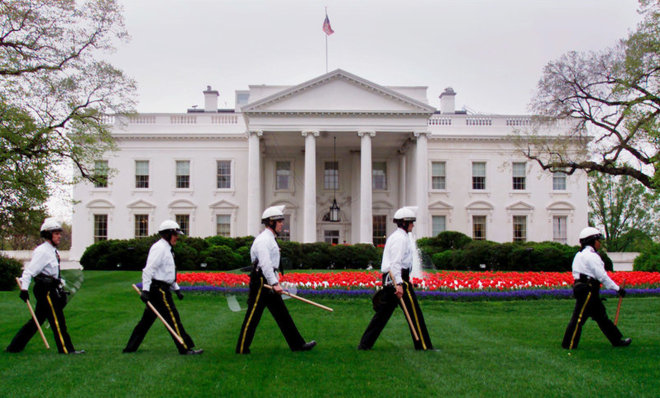What is the Uniformed Division of the Secret Service, anyway?
Just don't call them security guards...


Why is the White House protected by an entity called the "Uniformed Division of the Secret Service?" The naming convention is important. It certifies that its officers are not regular Secret Service agents. Depending on what you associate with the word "uniformed," you might think they perform a service function somehow — but they don't.
They regularly interact with the public, something most special agents don't do.
Their history is also unique. What is now the U.D. has ping-ponged between the Secret Service and other law-enforcement entities in the Washington area for more than a century. No one would claim them even though their jobs were crucial. The Uniformed Division became an official entity in 1977 under the direct supervision of the Secret Service's director. Its charter now includes the protection of the vice president's residence at the U.S. Naval Observatory and the many foreign missions around Washington. During campaign years, its officers and canine teams must sweep thousands of sites for explosives and physically screen more than a million people. When world leaders come to New York City, half the U.D. moves up to the Big Apple, providing perimeter protection and special security services to world leaders ranging from Mahmoud Ahmadinejad to Vladimir Putin. But the 18 acres of the White House complex are its prime responsibility.
The Week
Escape your echo chamber. Get the facts behind the news, plus analysis from multiple perspectives.

Sign up for The Week's Free Newsletters
From our morning news briefing to a weekly Good News Newsletter, get the best of The Week delivered directly to your inbox.
From our morning news briefing to a weekly Good News Newsletter, get the best of The Week delivered directly to your inbox.
In the Secret Service hierarchy today, the chief of the White House branch of the Uniformed Division reports to the deputy special-agent-in-charge of the White House complex. The instigation for this change was part organizational — it just made sense to streamline the chain of command — and cultural — the officers, standing out in white shirt and black slacks, have always played second fiddle to the special agents, who blend. The agents saw the officers as security guards and post-standers; the officers saw themselves as police officers who were constantly under appreciated and undermanned. As a practical matter, the more specialized the task of guarding the White House became, the more integrated with the Presidential Protective Division the U.D. had to be. They still operate on different radio frequencies, but agents and officers at the several command centers that jointly watch over the White House monitor both.
Understandably, Uniformed Division officers want to be seen as a special police force. So they brag about collars and lock-ups. They write tickets and respond to crimes. They call themselves sergeants, lieutenants, captains. They don't want to be seen as security guards.
Unfortunately, there is no other category for them to be in. Their main function is security, but they can use deadlier force than security guards; they carry much bigger guns; they protect the crown jewel of democracy. They are more likely to be caught in the line of fire.
The officers find special agents arrogant and imperious. They feel taken for granted. In general, agents hang with agents; officers hang with officers. Officers get accepted into programs that allow them to become agents. Agents don't apply to become officers.
A free daily email with the biggest news stories of the day – and the best features from TheWeek.com
Mark Sullivan, the immediate former director of the Secret Service, believed that the bastard-stepchild mentality that U.D. officers had adopted was detrimental to the security of the president and his family. He believed that if U.D. officers felt more like part of the team and were paid better, attrition would decline and officers would get better at their jobs. In 2010, he lobbied Congress for more money and got it. The PPD began to pair its agents with officers for some jobs. Supervisors were told to press for an "agents and officers" together mentality.
Starting officers take home a base salary of $55,000 a year now, which is competitive with other local police agencies. With overtime, they can make more than $70,000. After two years, they can try out for any number of special function teams, like countersnipers who regularly travel with the president, or K-9, or the SWAT-like Emergency Response Team.
Marc Ambinder is TheWeek.com's editor-at-large. He is the author, with D.B. Grady, of The Command and Deep State: Inside the Government Secrecy Industry. Marc is also a contributing editor for The Atlantic and GQ. Formerly, he served as White House correspondent for National Journal, chief political consultant for CBS News, and politics editor at The Atlantic. Marc is a 2001 graduate of Harvard. He is married to Michael Park, a corporate strategy consultant, and lives in Los Angeles.
-
 Trump’s Kennedy Center closure plan draws ire
Trump’s Kennedy Center closure plan draws ireSpeed Read Trump said he will close the center for two years for ‘renovations’
-
 Trump's ‘weaponization czar’ demoted at DOJ
Trump's ‘weaponization czar’ demoted at DOJSpeed Read Ed Martin lost his title as assistant attorney general
-
 Gabbard faces questions on vote raid, secret complaint
Gabbard faces questions on vote raid, secret complaintSpeed Read This comes as Trump has pushed Republicans to ‘take over’ voting
